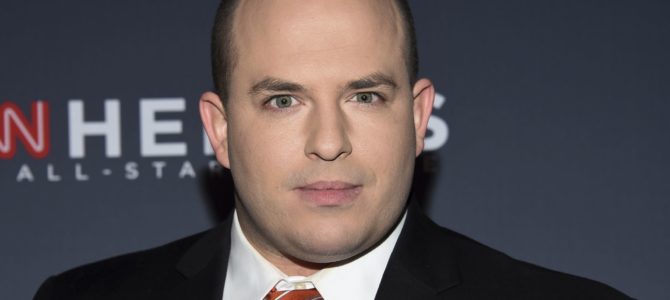
For a self-proclaimed “cable news nerd,” CNN Host Brian Stelter sure has a lot of stupid ideas about cable news. In a recent interview with Vox Media Founder Ezra Klein, Stelter outs himself as someone who somehow manages to anchor a cable news show about the media without actually knowing a lot about the media.
Throughout the interview, Klein runs circles around Stelter, pushing back on the CNN host’s assertions about the future of cable news and its crucial role in American culture.
“These days cable news is primarily a 24/7 talk show about politics and other news stories,” Stelter said.
“Is there a need for that?” Klein asked.
Great question, Ezra. Here are just some of the ways Stelter describes and defends his belief in the importance of cable news channels, verbatim.
1. ‘Titillate and Terrify’
Stelter said “pro-Trump” talk shows on Fox News are the only cable news content with skewed incentives, seeking to incite audiences for ratings. “The idea that ‘We’re going to make our viewers pissed’ is a Roger Ailes business model that was established 20 years ago,” he said.
Klein sternly disagreed. “No, I’m not just talking about Fox. Do you think CNN keeps people’s blood pressure down? I don’t.”
“I think that is a reflection of what’s going on in our country and I think cable news, especially the parts that are controversial is a reflection of what’s happening,” Stelter said.
Stelter goes on to argue that when CNN puts together mega-panels with nine-plus people on set, or lets their anchors read Democratic talking points, they’re not looking for a fight, they’re just “looking for a variety of voices.” But when Fox News puts a sensational spin on news events, it’s to “titillate and terrify” their audience.
2. ‘They’re Providing a Kind of Companionship’
“When CNN or MSNBC Or Fox are covering breaking news and making you feel a little less worried about the world, providing you companionship, that’s a really good thing,” he said.
One could make the case that broadcast channel morning shows such as “Good Morning America” and “The View” provide “companionship” to mothers and retirees who are making breakfast or folding laundry, but it’s a stretch to say that talking heads discussing the same topic every hour for 24 hours on CNN are playing a similar role.
What’s more interesting about Stelter’s idea that cable news anchors are making us “feel a little less worried” is that just minutes earlier in the interview, he was hounding the Fox News Channel for fear-mongering and chasing stories that make their audiences angry.
So do Fox audiences find companionship through fear-mongering, or is it only on Stelter’s network that viewers can tune into to find a reassuring companion?
3. ‘People Will Pay for Cable News Because It Keeps Them Safe’
When mulling over future potential revenue streams for cable news and how it can sustain itself in a time of uncertainty for journalism, Stelter said there will always be a role for cable news channels reporting breaking news in times of crisis or historical significance.
“The reason that I’m bullish fundamentally about cable news, what I think of as a linear stream of live news where breaking news takes precedence and we are talking about the news at other times, is that it plays roles in American life that are always going to need to be there,” he said. “There is a reassurance about what’s going on in the world around you role.”
Not only does social media already dominate cable news regarding our awareness of what’s going on in the world, but cable news has played perhaps the largest role in recent instances of mainstream media coverage that are the opposite of “safe.”
Do Americans feel more safe after cable news anchors yelled and cried during monologues about how their president is a Russian spy? Do American teenagers feel more safe after they watched a group of Catholic middle schoolers smeared on a national stage? Do American men feel more safe after reporters repeated baseless accusations of gang rape against a Supreme Court nominee? Does Stelter make Americans feel more safe when they watch his show and see him questioning the president’s mental health, or when he provides a friendly platform to thirsty con artist Michael Avenatti?
These are just a few of the instances in which Stelter should reflect on exactly what kind of effect cable news has had on American lives. As Klein points out, and despite what Stelter believes, cable news isn’t really about the “breaking news” anymore.
4. ‘I Haven’t Seen Many Applications of Youtube in the News World Yet’
Yes, that’s right, CNN’s media analyst doesn’t see the media value of YouTube, the world’s most-visited site by the most media-savvy generation to ever exist. Stelter even goes on to question whether media outlets can even trust YouTube’s ratings and to complain about the existence of “amateur” content on the site.
“Cable news has certain rhythms that make it more effective [than YouTube],” he said.
Yes, because that’s exactly what consumers want — their content completed curated by executives in New York, with little control over where or when they watch it. Stelter’s ignorance raises some questions: Does he genuinely believe cable news has a sustainable future compared to the highly successful shows across streaming platforms?
“People still need at certain times a live feed…Yes, some people are going to watch the Mars landing in 20 or 30 years on YouTube,” he said. “But you’re probably going to watch it in the biggest screen possible and you’re probably going to want to hear a trusted voice when it’s happening.”
Does Stelter believe millennial and Gen Z consumers find cable news anchors a more trusted voice than YouTubers? Indeed, much of the success of political and news-oriented YouTube shows is because of the fact that large media institutions have lost their audience’s trust. A 2018 Gallup poll found that 9 out of 10 conservatives or Republicans say their trust in news has declined in the last 10 years. So it’s probably not a coincidence that conservative or contrarian politically adjacent content creators (like Ben Shapiro, Joe Rogan, and Dave Rubin) have seen sky-rocketing success on YouTube.
Meanwhile, cable television providers are losing more than 1 million subscribers a year. In a three-year period between 2015 and 2018, cable news outlets lost 7.5 million traditional pay-TV households. Nearly half of those losses occurred between 2017 and 2018.
Perhaps Stelter genuinely believes that cable news is a public good that has a long future ahead. For his sake, let’s hope that’s the case. More likely, Stelter’s ignorance is not willful, but is due to the alluring self-importance of his role in the cable news machine. For our sake, let’s hope he starts to think about Klein’s initial question: Is there a need for that?









